amycuddyted演讲稿
- 格式:docx
- 大小:34.89 KB
- 文档页数:28
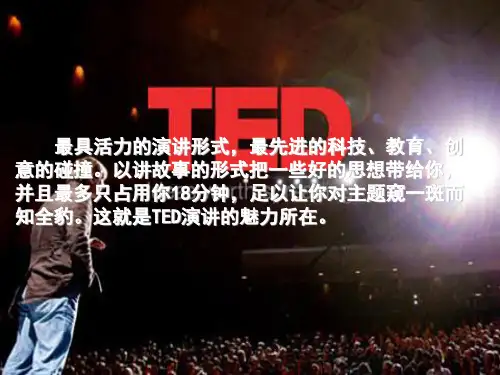
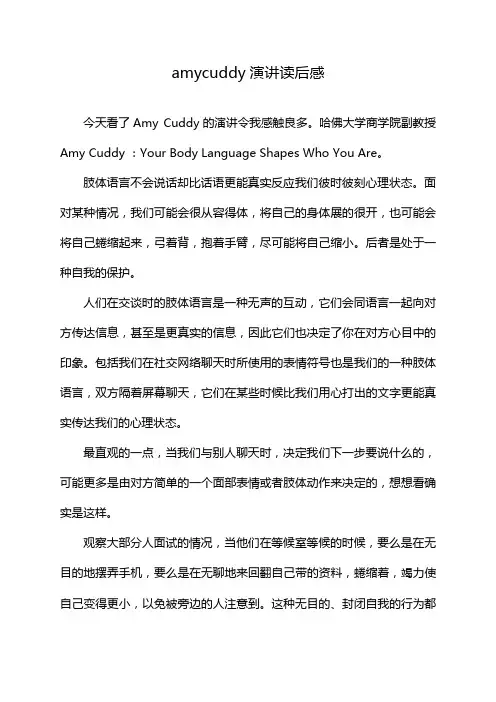
amycuddy演讲读后感今天看了Amy Cuddy的演讲令我感触良多。
哈佛大学商学院副教授Amy Cuddy :Your Body Language Shapes Who You Are。
肢体语言不会说话却比话语更能真实反应我们彼时彼刻心理状态。
面对某种情况,我们可能会很从容得体,将自己的身体展的很开,也可能会将自己蜷缩起来,弓着背,抱着手臂,尽可能将自己缩小。
后者是处于一种自我的保护。
人们在交谈时的肢体语言是一种无声的互动,它们会同语言一起向对方传达信息,甚至是更真实的信息,因此它们也决定了你在对方心目中的印象。
包括我们在社交网络聊天时所使用的表情符号也是我们的一种肢体语言,双方隔着屏幕聊天,它们在某些时候比我们用心打出的文字更能真实传达我们的心理状态。
最直观的一点,当我们与别人聊天时,决定我们下一步要说什么的,可能更多是由对方简单的一个面部表情或者肢体动作来决定的,想想看确实是这样。
观察大部分人面试的情况,当他们在等候室等候的时候,要么是在无目的地摆弄手机,要么是在无聊地来回翻自己带的资料,蜷缩着,竭力使自己变得更小,以免被旁边的人注意到。
这种无目的、封闭自我的行为都在传递着你的紧张、慌乱、不自信,等待的时间越久越糟糕,所以有的时候就会出现我们巴不得自己被早早面试,而不要被安排在最后,否则自己心理压力会越来越大,越来越大,原本有足够时间准备的到最后反而大脑一片空白。
与一个强势而有自信的人聊天,如果对方的肢体语言又十分丰富,若是自身不如对方,很可能对方越open,我们就越想close我们自己。
而若是双方都是心智能力很强的人,实力相当,我们很可能会去做出和对方相当的肢体语言,而且双当也都很舒服。
科学表明,我们的这些行为是受到两种激素影响的,一个是睾丸酮,另一个是可的松。
睾丸酮是一种支配激素,可的松是一种压力激素。
这两种激素会随着我们心理的变化在很短时间发生变化,从而影响我们的肢体语言。
我们的身体会改变心理,心理会改变行为,而行为会改变结果。
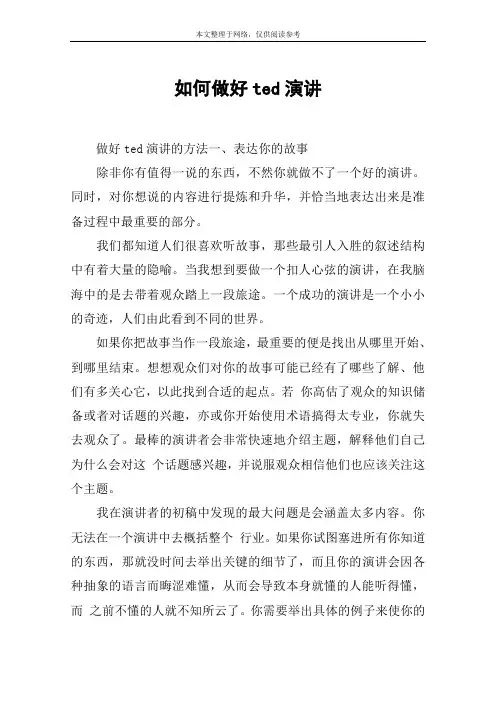
如何做好ted演讲做好ted演讲的方法一、表达你的故事除非你有值得一说的东西,不然你就做不了一个好的演讲。
同时,对你想说的内容进行提炼和升华,并恰当地表达出来是准备过程中最重要的部分。
我们都知道人们很喜欢听故事,那些最引人入胜的叙述结构中有着大量的隐喻。
当我想到要做一个扣人心弦的演讲,在我脑海中的是去带着观众踏上一段旅途。
一个成功的演讲是一个小小的奇迹,人们由此看到不同的世界。
如果你把故事当作一段旅途,最重要的便是找出从哪里开始、到哪里结束。
想想观众们对你的故事可能已经有了哪些了解、他们有多关心它,以此找到合适的起点。
若你高估了观众的知识储备或者对话题的兴趣,亦或你开始使用术语搞得太专业,你就失去观众了。
最棒的演讲者会非常快速地介绍主题,解释他们自己为什么会对这个话题感兴趣,并说服观众相信他们也应该关注这个主题。
我在演讲者的初稿中发现的最大问题是会涵盖太多内容。
你无法在一个演讲中去概括整个行业。
如果你试图塞进所有你知道的东西,那就没时间去举出关键的细节了,而且你的演讲会因各种抽象的语言而晦涩难懂,从而会导致本身就懂的人能听得懂,而之前不懂的人就不知所云了。
你需要举出具体的例子来使你的想法有血有肉充实起来。
所以,把你的演讲局限在可以被解释清楚的范围内,并且尽可能举出例子使其生动。
我们在筹备前期给讲者的反馈大多是建议他们不要太冲动,不要一心想把所有东西都纳入到一个短短的演讲,相反应当深入下去把内容细节化。
不要告诉我们你研究的整个领域,要给我们分享你独一无二的贡献成果。
当然,过度阐述或者纠结于内容的意义也不可行。
对这种情况有另一套补救的方法。
记住观众们很聪明,让他们自己去找寻出一些意义,去各自归纳收获的结论。
很多顶级的演讲具有着侦探小说般松散的叙事结构。
演讲者引出问题开始演讲,然后介绍寻求解决方法的过程,直到恍然大悟的一刻,这时观众自会看到这一切叙述的意义。
如果一个演讲失败了,大多数是因为讲者没有找到好的表达方法,错误估计了观众的兴趣点,或者忽略了故事本身。
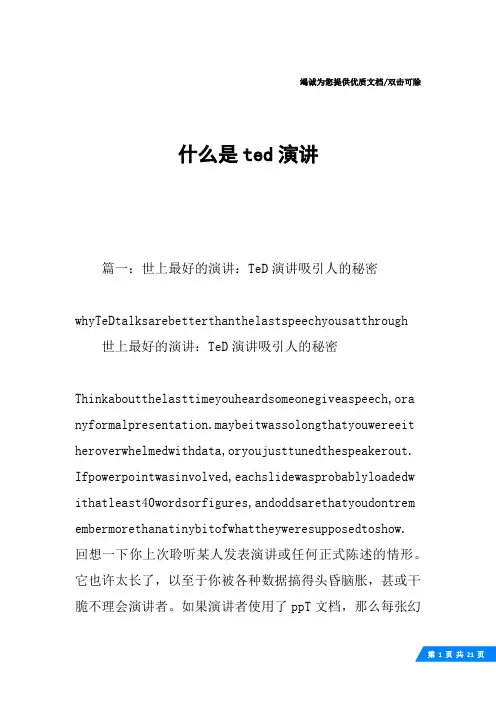
竭诚为您提供优质文档/双击可除什么是ted演讲篇一:世上最好的演讲:TeD演讲吸引人的秘密whyTeDtalksarebetterthanthelastspeechyousatthrough 世上最好的演讲:TeD演讲吸引人的秘密Thinkaboutthelasttimeyouheardsomeonegiveaspeech,ora nyformalpresentation.maybeitwassolongthatyouwereeit heroverwhelmedwithdata,oryoujusttunedthespeakerout. Ifpowerpointwasinvolved,eachslidewasprobablyloadedw ithatleast40wordsorfigures,andoddsarethatyoudontrem embermorethanatinybitofwhattheyweresupposedtoshow.回想一下你上次聆听某人发表演讲或任何正式陈述的情形。
它也许太长了,以至于你被各种数据搞得头昏脑胀,甚或干脆不理会演讲者。
如果演讲者使用了ppT文档,那么每张幻灯片很可能塞入了至少40个单词或数字,但你现在或许只记得一丁点内容。
prettyuninspiring,huh?TalkLikeTeD:9public-speakings ecretsofTheworldsbestmindsexamineswhyinprosethatsas livelyandappealingas,well,aTeDtalk.Timedtocoincidew iththe30thanniversaryinmarchofthosenow-legendaryTeD conferences,thebookdrawsoncurrentbrainsciencetoexpl ainwhatwinsover,andfiresup,anaudience--andwhatdoesn t.Authorcarminegalloalsostudiedmorethan500ofthemost popularTeDspeeches(therehavebeenabout1,500sofar)and interviewedscoresofthepeoplewhogavethem.相当平淡,是吧?《像TeD那样演讲:全球顶级人才九大演讲秘诀》(TalkLikeTeD:9public-speakingsecretsofTheworldsbest minds)一书以流畅的文笔审视了为什么TeD演讲如此生动,如此引人入胜。
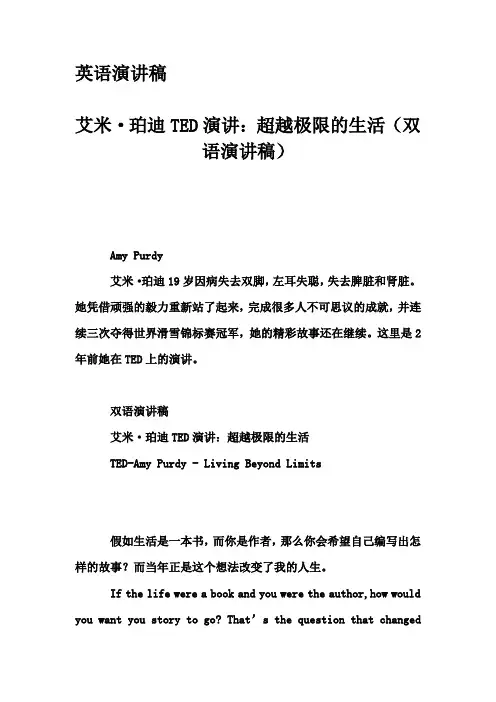
英语演讲稿艾米·珀迪TED演讲:超越极限的生活(双语演讲稿)Amy Purdy艾米·珀迪19岁因病失去双脚,左耳失聪,失去脾脏和肾脏。
她凭借顽强的毅力重新站了起来,完成很多人不可思议的成就,并连续三次夺得世界滑雪锦标赛冠军,她的精彩故事还在继续。
这里是2年前她在TED上的演讲。
双语演讲稿艾米·珀迪TED演讲:超越极限的生活TED-Amy Purdy - Living Beyond Limits假如生活是一本书,而你是作者,那么你会希望自己编写出怎样的故事?而当年正是这个想法改变了我的人生。
If the life were a book and you were the author,how would you want you story to go? That’s the question that changedmy life for ever.我在炎热的拉斯维加斯的沙漠中长大,我所向往的是自由自在的生活。
我做着周游世界的白日梦,想象着能够住在下雪的地方,并把所有想讲的故事一一拍摄出来。
19岁那年,高中毕业后的一天,我真的去了下雪的地方,成为了一名按摩治疗师。
这份工作只需要用到手,旁边就是按摩桌。
那时的我能去任何地方。
这是人生中第一次,我感到自由、独立、安全。
生活就在我的掌控之中。
Growing up in a hot Las Vegas desert, all I wanted was to be free,I would day dream about travelling the world, living in a place where it snowed, and I would picture all of the stories that I would go on to tell. At the age of nineteen, the day after I graduate high school, I do to a place where it snowed and I became a massage therapist. With this job all I needed were my hands and my massage table by my side and I would go anywhere. For the first time in my life, I felt free, independent, and completely in control of my life.但这时我的生活出现了逆转。
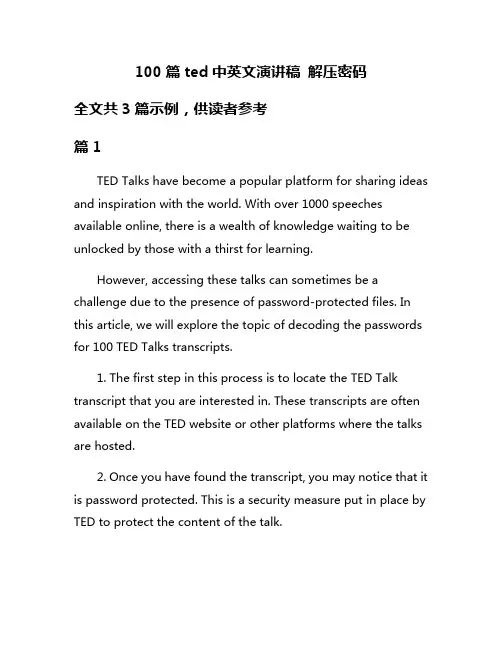
100篇ted中英文演讲稿解压密码全文共3篇示例,供读者参考篇1TED Talks have become a popular platform for sharing ideas and inspiration with the world. With over 1000 speeches available online, there is a wealth of knowledge waiting to be unlocked by those with a thirst for learning.However, accessing these talks can sometimes be a challenge due to the presence of password-protected files. In this article, we will explore the topic of decoding the passwords for 100 TED Talks transcripts.1. The first step in this process is to locate the TED Talk transcript that you are interested in. These transcripts are often available on the TED website or other platforms where the talks are hosted.2. Once you have found the transcript, you may notice that it is password protected. This is a security measure put in place by TED to protect the content of the talk.3. To decode the password, you will need to use a password cracking tool. There are many different tools available online that can help you with this task.4. One popular password cracking tool is John the Ripper, which is a powerful software program that can help you unlock password-protected files.5. By using John the Ripper or a similar tool, you can input the password-protected file into the program and let it run through its algorithms to decode the password.6. Once the password has been decoded, you will be able to access the transcript of the TED Talk and unlock the knowledge and wisdom contained within.7. It is important to note that decoding passwords for unauthorized access is illegal and unethical. It is always best to obtain permission from the content creator before accessing their work.In conclusion, unlocking password-protected TED Talk transcripts can be a rewarding experience for those who are dedicated to learning and growth. By following the steps outlined in this article, you can access a wealth of knowledge and inspiration that will enrich your life.篇2TED Talks have become a popular platform for sharing ideas and inspiring others. With a wide range of topics covered, these talks provide a unique opportunity for speakers to connect with audiences from around the world. In this document, we will provide a collection of 100 TED Talks transcripts, along with the decryption password.Please note that the decryption password will be provided at the end of this document.1. "The Power of Vulnerability" by Brené Brown2. "Your Body Language May Shape Who You Are" by Amy Cuddy3. "How Great Leaders Inspire Action" by Simon Sinek4. "Do Schools Kill Creativity?" by Sir Ken Robinson5. "The Puzzle of Motivation" by Dan Pink6. "The Happy Secret to Better Work" by Shawn Achor7. "How to Speak So That People Want to Listen" by Julian Treasure8. "The Power of Introverts" by Susan Cain9. "Why Good Leaders Make You Feel Safe" by Simon Sinek10. "The Art of Stress-Free Productivity" by David AllenAnd so on, these are just a few examples of the many inspiring and thought-provoking TED Talks that have been shared over the years. To access the full collection of 100 TED Talks transcripts, please enter the following decryption password:Password: TEDtalks2021With this password, you can unlock a treasure trove of knowledge, insights, and inspiration from some of the world's leading thinkers and innovators. Enjoy exploring these talks and let them ignite your own curiosity and creativity.篇3TED talks are known for their inspiring andthought-provoking content that covers a wide range of topics. One common thread that ties many of these talks together is the idea of finding ways to improve our lives and make the world a better place. In this collection of 100 TED talk transcripts, we will explore the themes of personal growth, innovation, social change, and more.But before you dive into these transcripts, you'll need the password to unlock them. The password for this collection is "TED2021". With this password, you can unlock a wealth of knowledge and inspiration that can help you expand your horizons and make a positive impact on the world around you.Each talk in this collection offers a unique perspective and valuable insights that can help you navigate the complexities of modern life. From understanding the power of vulnerability to exploring the potential of artificial intelligence, these talks cover a wide range of topics that are relevant to our ever-changing world.So, whether you're looking for motivation to pursue your dreams, insights on how to lead a more fulfilling life, or ideas on how to create positive change in your community, these 100 TED talk transcripts have something for everyone. Just remember to enter the password "TED2021" to unlock this treasure trove of wisdom and inspiration.。
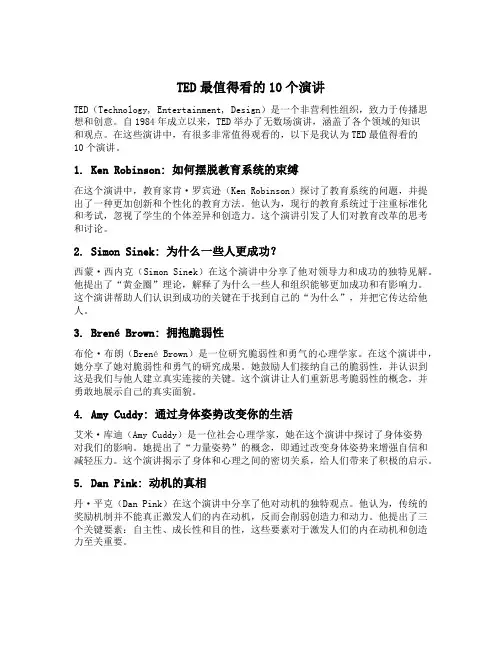
TED最值得看的10个演讲TED(Technology, Entertainment, Design)是一个非营利性组织,致力于传播思想和创意。
自1984年成立以来,TED举办了无数场演讲,涵盖了各个领域的知识和观点。
在这些演讲中,有很多非常值得观看的,以下是我认为TED最值得看的10个演讲。
1. Ken Robinson: 如何摆脱教育系统的束缚在这个演讲中,教育家肯·罗宾逊(Ken Robinson)探讨了教育系统的问题,并提出了一种更加创新和个性化的教育方法。
他认为,现行的教育系统过于注重标准化和考试,忽视了学生的个体差异和创造力。
这个演讲引发了人们对教育改革的思考和讨论。
2. Simon Sinek: 为什么一些人更成功?西蒙·西内克(Simon Sinek)在这个演讲中分享了他对领导力和成功的独特见解。
他提出了“黄金圈”理论,解释了为什么一些人和组织能够更加成功和有影响力。
这个演讲帮助人们认识到成功的关键在于找到自己的“为什么”,并把它传达给他人。
3. Brené Brown: 拥抱脆弱性布伦·布朗(Brené Brown)是一位研究脆弱性和勇气的心理学家。
在这个演讲中,她分享了她对脆弱性和勇气的研究成果。
她鼓励人们接纳自己的脆弱性,并认识到这是我们与他人建立真实连接的关键。
这个演讲让人们重新思考脆弱性的概念,并勇敢地展示自己的真实面貌。
4. Amy Cuddy: 通过身体姿势改变你的生活艾米·库迪(Amy Cuddy)是一位社会心理学家,她在这个演讲中探讨了身体姿势对我们的影响。
她提出了“力量姿势”的概念,即通过改变身体姿势来增强自信和减轻压力。
这个演讲揭示了身体和心理之间的密切关系,给人们带来了积极的启示。
5. Dan Pink: 动机的真相丹·平克(Dan Pink)在这个演讲中分享了他对动机的独特观点。
他认为,传统的奖励机制并不能真正激发人们的内在动机,反而会削弱创造力和动力。
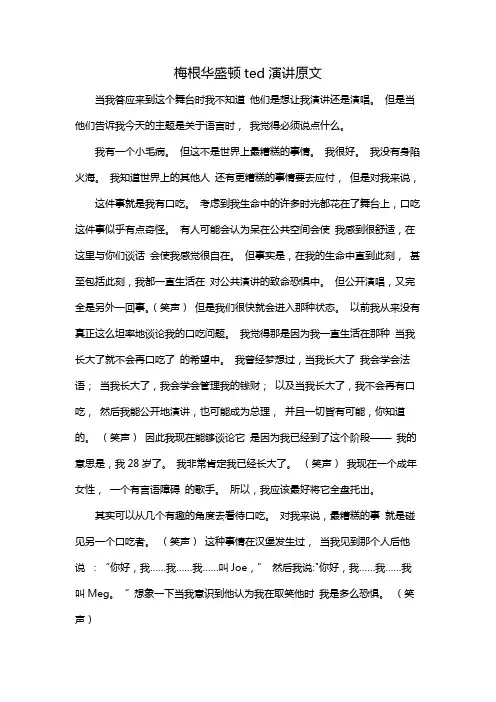
梅根华盛顿ted演讲原文当我答应来到这个舞台时我不知道他们是想让我演讲还是演唱。
但是当他们告诉我今天的主题是关于语言时,我觉得必须说点什么。
我有一个小毛病。
但这不是世界上最糟糕的事情。
我很好。
我没有身陷火海。
我知道世界上的其他人还有更糟糕的事情要去应付,但是对我来说,这件事就是我有口吃。
考虑到我生命中的许多时光都花在了舞台上,口吃这件事似乎有点奇怪。
有人可能会认为呆在公共空间会使我感到很舒适,在这里与你们谈话会使我感觉很自在。
但事实是,在我的生命中直到此刻,甚至包括此刻,我都一直生活在对公共演讲的致命恐惧中。
但公开演唱,又完全是另外一回事。
(笑声)但是我们很快就会进入那种状态。
以前我从来没有真正这么坦率地谈论我的口吃问题。
我觉得那是因为我一直生活在那种当我长大了就不会再口吃了的希望中。
我曾经梦想过,当我长大了我会学会法语;当我长大了,我会学会管理我的钱财;以及当我长大了,我不会再有口吃,然后我能公开地演讲,也可能成为总理,并且一切皆有可能,你知道的。
(笑声)因此我现在能够谈论它是因为我已经到了这个阶段——我的意思是,我28岁了。
我非常肯定我已经长大了。
(笑声)我现在一个成年女性,一个有言语障碍的歌手。
所以,我应该最好将它全盘托出。
其实可以从几个有趣的角度去看待口吃。
对我来说,最糟糕的事就是碰见另一个口吃者。
(笑声)这种事情在汉堡发生过,当我见到那个人后他说:“你好,我……我……我……叫Joe,” 然后我说:"你好,我……我……我叫Meg。
“ 想象一下当我意识到他认为我在取笑他时我是多么恐惧。
(笑声)人们总是以为我喝醉了。
(笑声)当我在说出别人的名字之前犹豫一下时,他们会认为我想不起来他们的名字了。
这是一件非常奇怪的事,因为专有名词对我来说是最难的。
如果我打算在一个句子中使用“星期三”这个词,然后当我即将说到这个词时,我预料到我将会结巴或者别的情况,我可以将“星期三”替换成“明天”,或者“星期二之后的一天” 或其它诸如此类的。
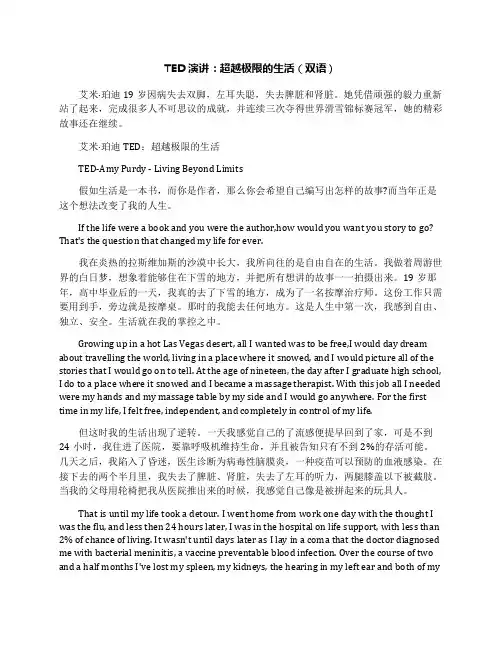
TED演讲:超越极限的生活(双语)艾米·珀迪19岁因病失去双脚,左耳失聪,失去脾脏和肾脏。
她凭借顽强的毅力重新站了起来,完成很多人不可思议的成就,并连续三次夺得世界滑雪锦标赛冠军,她的精彩故事还在继续。
艾米·珀迪TED:超越极限的生活TED-Amy Purdy - Living Beyond Limits假如生活是一本书,而你是作者,那么你会希望自己编写出怎样的故事?而当年正是这个想法改变了我的人生。
If the life were a book and you were the author,how would you want you story to go? That's the question that changed my life for ever.我在炎热的拉斯维加斯的沙漠中长大,我所向往的是自由自在的生活。
我做着周游世界的白日梦,想象着能够住在下雪的地方,并把所有想讲的故事一一拍摄出来。
19岁那年,高中毕业后的一天,我真的去了下雪的地方,成为了一名按摩治疗师。
这份工作只需要用到手,旁边就是按摩桌。
那时的我能去任何地方。
这是人生中第一次,我感到自由、独立、安全。
生活就在我的掌控之中。
Growing up in a hot Las Vegas desert, all I wanted was to be free,I would day dream about travelling the world, living in a place where it snowed, and I would picture all of the stories that I would go on to tell. At the age of nineteen, the day after I graduate high school, I do to a place where it snowed and I became a massage therapist. With this job all I needed were my hands and my massage table by my side and I would go anywhere. For the first time in my life, I felt free, independent, and completely in control of my life.但这时我的生活出现了逆转。
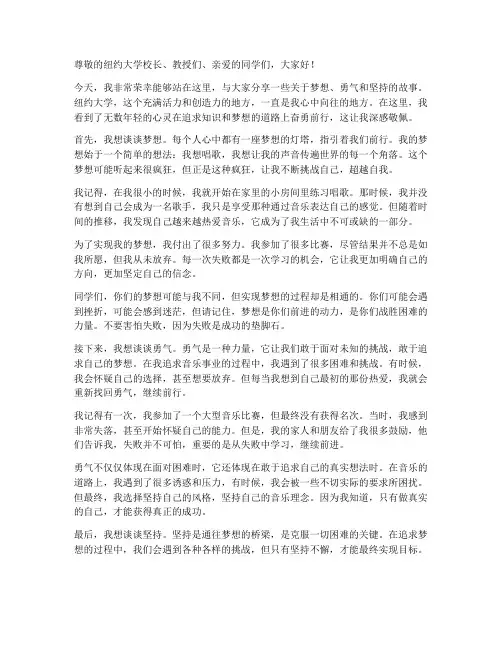
尊敬的纽约大学校长、教授们、亲爱的同学们,大家好!今天,我非常荣幸能够站在这里,与大家分享一些关于梦想、勇气和坚持的故事。
纽约大学,这个充满活力和创造力的地方,一直是我心中向往的地方。
在这里,我看到了无数年轻的心灵在追求知识和梦想的道路上奋勇前行,这让我深感敬佩。
首先,我想谈谈梦想。
每个人心中都有一座梦想的灯塔,指引着我们前行。
我的梦想始于一个简单的想法:我想唱歌,我想让我的声音传遍世界的每一个角落。
这个梦想可能听起来很疯狂,但正是这种疯狂,让我不断挑战自己,超越自我。
我记得,在我很小的时候,我就开始在家里的小房间里练习唱歌。
那时候,我并没有想到自己会成为一名歌手,我只是享受那种通过音乐表达自己的感觉。
但随着时间的推移,我发现自己越来越热爱音乐,它成为了我生活中不可或缺的一部分。
为了实现我的梦想,我付出了很多努力。
我参加了很多比赛,尽管结果并不总是如我所愿,但我从未放弃。
每一次失败都是一次学习的机会,它让我更加明确自己的方向,更加坚定自己的信念。
同学们,你们的梦想可能与我不同,但实现梦想的过程却是相通的。
你们可能会遇到挫折,可能会感到迷茫,但请记住,梦想是你们前进的动力,是你们战胜困难的力量。
不要害怕失败,因为失败是成功的垫脚石。
接下来,我想谈谈勇气。
勇气是一种力量,它让我们敢于面对未知的挑战,敢于追求自己的梦想。
在我追求音乐事业的过程中,我遇到了很多困难和挑战。
有时候,我会怀疑自己的选择,甚至想要放弃。
但每当我想到自己最初的那份热爱,我就会重新找回勇气,继续前行。
我记得有一次,我参加了一个大型音乐比赛,但最终没有获得名次。
当时,我感到非常失落,甚至开始怀疑自己的能力。
但是,我的家人和朋友给了我很多鼓励,他们告诉我,失败并不可怕,重要的是从失败中学习,继续前进。
勇气不仅仅体现在面对困难时,它还体现在敢于追求自己的真实想法时。
在音乐的道路上,我遇到了很多诱惑和压力,有时候,我会被一些不切实际的要求所困扰。
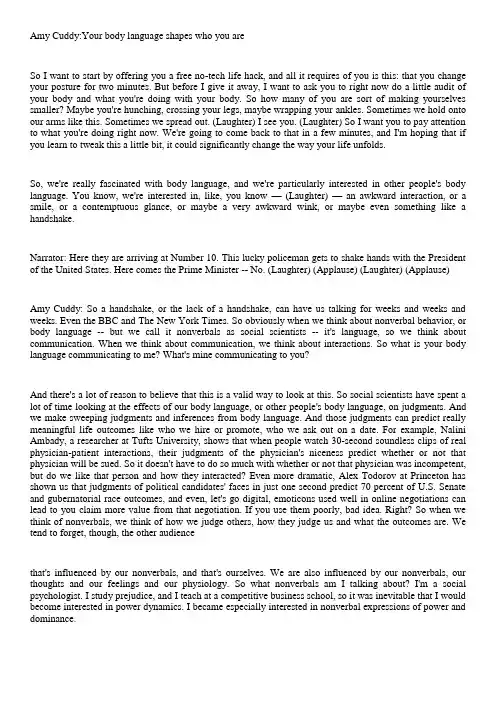
Amy Cuddy:Your body language shapes who you areSo I want to start by offering you a free no-tech life hack, and all it requires of you is this: that you change your posture for two minutes. But before I give it away, I want to ask you to right now do a little audit of your body and what you're doing with your body. So how many of you are sort of making yourselves smaller? Maybe you're hunching, crossing your legs, maybe wrapping your ankles. Sometimes we hold onto our arms like this. Sometimes we spread out. (Laughter) I see you. (Laughter) So I want you to pay attention to what you're doing right now. We're going to come back to that in a few minutes, and I'm hoping that if you learn to tweak this a little bit, it could significantly change the way your life unfolds.So, we're really fascinated with body language, and we're particularly interested in other people's body language. You know, we're interested in, like, you know —(Laughter) —an awkward interaction, or a smile, or a contemptuous glance, or maybe a very awkward wink, or maybe even something like a handshake.Narrator: Here they are arriving at Number 10. This lucky policeman gets to shake hands with the President of the United States. Here comes the Prime Minister -- No. (Laughter) (Applause) (Laughter) (Applause)Amy Cuddy: So a handshake, or the lack of a handshake, can have us talking for weeks and weeks and weeks. Even the BBC and The New York Times. So obviously when we think about nonverbal behavior, or body language -- but we call it nonverbals as social scientists -- it's language, so we think about communication. When we think about communication, we think about interactions. So what is your body language communicating to me? What's mine communicating to you?And there's a lot of reason to believe that this is a valid way to look at this. So social scientists have spent a lot of time looking at the effects of our body language, or other people's body language, on judgments. And we make sweeping judgments and inferences from body language. And those judgments can predict really meaningful life outcomes like who we hire or promote, who we ask out on a date. For example, Nalini Ambady, a researcher at Tufts University, shows that when people watch 30-second soundless clips of real physician-patient interactions, their judgments of the physician's niceness predict whether or not that physician will be sued. So it doesn't have to do so much with whether or not that physician was incompetent, but do we like that person and how they interacted? Even more dramatic, Alex Todorov at Princeton has shown us that judgments of political candidates' faces in just one second predict 70 percent of U.S. Senate and gubernatorial race outcomes, and even, let's go digital, emoticons used well in online negotiations can lead to you claim more value from that negotiation. If you use them poorly, bad idea. Right? So when we think of nonverbals, we think of how we judge others, how they judge us and what the outcomes are. We tend to forget, though, the other audiencethat's influenced by our nonverbals, and that's ourselves. We are also influenced by our nonverbals, our thoughts and our feelings and our physiology. So what nonverbals am I talking about? I'm a social psychologist. I study prejudice, and I teach at a competitive business school, so it was inevitable that I would become interested in power dynamics. I became especially interested in nonverbal expressions of power and dominance.And what are nonverbal expressions of power and dominance? Well, this is what they are. So in the animal kingdom, they are about expanding. So you make yourself big, you stretch out, you take up space, you're basically opening up. It's about opening up. And this is true across the animal kingdom. It's not just limited to primates. And humans do the same thing. (Laughter) So they do this both when they have power sort of chronically, and also when they're feeling powerful in the moment. And this one is especially interesting because it really shows us how universal and old these expressions of power are. This expression, which is known as pride, Jessica Tracy has studied. She shows that people who are born with sight and people who are congenitally blind do this when they win at a physical competition. So when they cross the finish line and they've won, it doesn't matter if they've never seen anyone do it. They do this. So the arms up in the V, the chin is slightly lifted. What do we do when we feel powerless? We do exactly the opposite. We close up. We wrap ourselves up. We make ourselves small. We don't want to bump into the person next to us. So again, both animals and humans do the same thing. And this is what happens when you put together high and low power. So what we tend to do when it comes to power is that we complement the other's nonverbals. So if someone is being really powerful with us, we tend to make ourselves smaller. We don't mirror them. We do the opposite of them.So I'm watching this behavior in the classroom, and what do I notice? I notice that MBA students really exhibit the full range of power nonverbals. So you have people who are like caricatures of alphas, really coming into the room, they get right into the middle of the room before class even starts, like they really want to occupy space. When they sit down, they're sort of spread out. They raise their hands like this. You have other people who are virtually collapsing when they come in. As soon they come in, you see it. You see it on their faces and their bodies, and they sit in their chair and they make themselves tiny, and they go like this when they raise their hand. I notice a couple of things about this. One, you're not going to be surprised. It seems to be related to gender. So women are much more likely to do this kind of thing than men. Women feel chronically less powerful than men, so this is not surprising. But the other thing I noticed is that it also seemed to be related to the extent to which the students were participating, and how well they were participating. And this is really important in the MBA classroom, because participation counts for half the grade.So business schools have been struggling with this gender grade gap. You get these equally qualified women and men coming in and then you get these differences in grades, and it seems to be partly attributable to participation. So I started to wonder, you know, okay, so you have these people coming in like this, and they're participating. Is it possible that we could get people to fake it and would it lead them to participate more?So my main collaborator Dana Carney, who's at Berkeley, and I really wanted to know, can you fake it till you make it? Like, can you do this just for a little while and actually experience a behavioral outcome that makes you seem more powerful? So we know that our nonverbals govern how other people think and feel about us. There's a lot of evidence. But our question really was, do our nonverbals govern how we think and feel about ourselves?There's some evidence that they do. So, for example, we smile when we feel happy, but also, when we're forced to smile by holding a pen in our teeth like this, it makes us feel happy. So it goes both ways. When it comes to power, it also goes both ways. So when you feel powerful, you're more likely to do this, but it's also possible that when you pretend to be powerful, you are more likely to actually feel powerful.So the second question really was, you know, so we know that our minds change our bodies, but is it also true that our bodies change our minds? And when I say minds, in the case of the powerful, what am I talkingabout? So I'm talking about thoughts and feelings and the sort of physiological things that make up our thoughts and feelings, and in my case, that's hormones. I look at hormones. So what do the minds of the powerful versus the powerless look like? So powerful people tend to be, not surprisingly, more assertive and more confident, more optimistic. They actually feel they're going to win even at games of chance. They also tend to be able to think more abstractly. So there are a lot of differences. They take more risks. There are a lot of differences between powerful and powerless people. Physiologically, there also are differences on two key hormones: testosterone, which is the dominance hormone, and cortisol, which is the stress hormone. So what we find is that high-power alpha males in primate hierarchies have high testosterone and low cortisol, and powerful and effective leaders also have high testosterone and low cortisol. So what does that mean? When you think about power, people tended to think only about testosterone, because that was about dominance. But really, power is also about how you react to stress. So do you want the high-power leader that's dominant, high on testosterone, but really stress reactive? Probably not, right? You want the person who's powerful and assertive and dominant, but not very stress reactive, the person who's laid back.So we know that in primate hierarchies, if an alpha needs to take over, if an individual needs to take over an alpha role sort of suddenly, within a few days, that individual's testosterone has gone up significantly and his cortisol has dropped significantly. So we have this evidence, both that the body can shape the mind, at least at the facial level, and also that role changes can shape the mind. So what happens, okay, you take a role change, what happens if you do that at a really minimal level, like this tiny manipulation, this tiny intervention? "For two minutes," you say, "I want you to stand like this, and it's going to make you feel more powerful."So this is what we did. We decided to bring people into the lab and run a little experiment, and these people adopted, for two minutes, either high-power poses or low-power poses, and I'm just going to show you five of the poses, although they took on only two. So here's one. A couple more. This one has been dubbed the "Wonder Woman" by the media. Here are a couple more. So you can be standing or you can be sitting. And here are the low-power poses. So you're folding up, you're making yourself small. This one is very low-power. When you're touching your neck, you're really protecting yourself. So this is what happens. They come in, they spit into a vial, for two minutes, we say, "You need to do this or this." They don't look at pictures of the poses. We don't want to prime them with a concept of power. We want them to be feeling power. So two minutes they do this. We then ask them, "How powerful do you feel?" on a series of items, and then we give them an opportunity to gamble, and then we take another saliva sample. That's it. That's the whole experiment.So this is what we find. Risk tolerance, which is the gambling, we find that when you are in the high-power pose condition, 86 percent of you will gamble. When you're in the low-power pose condition, only 60 percent, and that's a whopping significant difference. Here's what we find on testosterone. From their baseline when they come in, high-power people experience about a 20-percent increase, and low-power people experience about a 10-percent decrease. So again, two minutes, and you get these changes. Here's what you get on cortisol. High-power people experience about a 25-percent decrease, and the low-power people experience about a 15-percent increase. So two minutes lead to these hormonal changes that configure your brain to basically be either assertive, confident and comfortable, or really stress-reactive, and feeling sort of shut down. And we've all had the feeling, right? So it seems that our nonverbals do govern how we think and feel about ourselves, so it's not just others, but it's also ourselves. Also, our bodies change our minds.But the next question, of course, is, can power posing for a few minutes really change your life in meaningful ways? This is in the lab, it's this little task, it's just a couple of minutes. Where can you actually apply this? Which we cared about, of course. And so we think where you want to use this is evaluativesituations, like social threat situations. Where are you being evaluated, either by your friends? For teenagers, it's at the lunchroom table. For some people it's speaking at a school board meeting. It might be giving a pitch or giving a talk like this or doing a job interview. We decided that the one that most people could relate to because most people had been through, was the job interview.So we published these findings, and the media are all over it, and they say, Okay, so this is what you do when you go in for the job interview, right? (Laughter) You know, so we were of course horrified, and said, Oh my God, no, that's not what we meant at all. For numerous reasons, no, don't do that. Again, this is not about you talking to other people. It's you talking to yourself. What do you do before you go into a job interview? You do this. You're sitting down. You're looking at your iPhone -- or your Android, not trying to leave anyone out. You're looking at your notes, you're hunching up, making yourself small, when really what you should be doing maybe is this, like, in the bathroom, right? Do that. Find two minutes. So that's what we want to test. Okay? So we bring people into a lab, and they do either high- or low-power poses again, they go through a very stressful job interview. It's five minutes long. They are being recorded. They're being judged also, and the judges are trained to give no nonverbal feedback, so they look like this. Imagine this is the person interviewing you. So for five minutes, nothing, and this is worse than being heckled. People hate this. It's what Marianne LaFrance calls "standing in social quicksand." So this really spikes your cortisol. So this is the job interview we put them through, because we really wanted to see what happened. We then have these coders look at these tapes, four of them. They're blind to the hypothesis. They're blind to the conditions. They have no idea who's been posing in what pose, and they end up looking at these sets of tapes, and they say, "We want to hire these people," all the high-power posers. "We don't want to hire these people. We also evaluate these people much more positively overall." But what's driving it? It's not about the content of the speech. It's about the presence that they're bringing to the speech. Because we rate them on all these variables related to competence, like, how well-structured is the speech? How good is it? What are their qualifications? No effect on those things. This is what's affected. These kinds of things. People are bringing their true selves, basically. They're bringing themselves. They bring their ideas, but as themselves, with no, you know, residue over them. So this is what's driving the effect, or mediating the effect.So when I tell people about this, that our bodies change our minds and our minds can change our behavior, and our behavior can change our outcomes, they say to me, "It feels fake." Right? So I said, fake it till you make it. It's not me. I don't want to get there and then still feel like a fraud. I don't want to feel like an impostor. I don't want to get there only to feel like I'm not supposed to be here. And that really resonated with me, because I want to tell you a little story about being an impostor and feeling like I'm not supposed to be here.When I was 19, I was in a really bad car accident. I was thrown out of a car, rolled several times. I was thrown from the car. And I woke up in a head injury rehab ward, and I had been withdrawn from college, and I learned that my I.Q. had dropped by two standard deviations, which was very traumatic. I knew my I.Q. because I had identified with being smart, and I had been called gifted as a child. So I'm taken out of college, I keep trying to go back. They say, "You're not going to finish college. Just, you know, there are other things for you to do, but that's not going to work out for you." So I really struggled with this, and I have to say, having your identity taken from you, your core identity, and for me it was being smart, having that taken from you, there's nothing that leaves you feeling more powerless than that. So I felt entirely powerless. I worked and worked, and I got lucky, and worked, and got lucky, and worked.Eventually I graduated from college. It took me four years longer than my peers, and I convinced someone, my angel advisor, Susan Fiske, to take me on, and so I ended up at Princeton, and I was like, I am not supposed to be here. I am an impostor. And the night before my first-year talk, and the first-year talk at Princeton is a 20-minute talk to 20 people. That's it. I was so afraid of being found out the next day that Icalled her and said, "I'm quitting." She was like, "You are not quitting, because I took a gamble on you, and you're staying. You're going to stay, and this is what you're going to do. You are going to fake it. You're going to do every talk that you ever get asked to do. You're just going to do it and do it and do it, even if you're terrified and just paralyzed and having an out-of-body experience, until you have this moment where you say, 'Oh my gosh, I'm doing it. Like, I have become this. I am actually doing this.'" So that's what I did. Five years in grad school, a few years, you know, I'm at Northwestern, I moved to Harvard, I'm at Harvard, I'm not really thinking about it anymore, but for a long time I had been thinking, "Not supposed to be here." So at the end of my first year at Harvard, a student who had not talked in class the entire semester, who I had said, "Look, you've gotta participate or else you're going to fail," came into my office. I really didn't know her at all. She came in totally defeated, and she said, "I'm not supposed to be here." And that was the moment for me. Because two things happened. One was that I realized, oh my gosh, I don't feel like that anymore. I don't feel that anymore, but she does, and I get that feeling. And the second was, she is supposed to be here! Like, she can fake it, she can become it. So I was like, "Yes, you are! You are supposed to be here! And tomorrow you're going to fake it, you're going to make yourself powerful, and, you know -- (Applause) "And you're going to go into the classroom, and you are going to give the best comment ever." You know? And she gave the best comment ever, And people turned around and were like, oh my God, I didn't even notice her sitting there. (Laughter)She comes back to me months later, and I realized that she had not just faked it till she made it, she had actually faked it till she became it. So she had changed. And so I want to say to you, don't fake it till you make it. Fake it till you become it. Do it enough until you actually become it and internalize.The last thing I'm going to leave you with is this. Tiny tweaks can lead to big changes. So, this is two minutes. Two minutes, two minutes, two minutes. Before you go into the next stressful evaluative situation, for two minutes, try doing this, in the elevator, in a bathroom stall, at your desk behind closed doors. That's what you want to do. Configure your brain to cope the best in that situation. Get your testosterone up. Get your cortisol down. Don't leave that situation feeling like, oh, I didn't show them who I am. Leave that situation feeling like, I really feel like I got to say who I am and show who I am.So I want to ask you first, you know, both to try power posing, and also I want to ask you to share the science, because this is simple. I don't have ego involved in this. (Laughter) Give it away. Share it with people, because the people who can use it the most are the ones with no resources and no technology and no status and no power. Give it to them because they can do it in private. They need their bodies, privacy and two minutes, and it can significantly change the outcomes of their life. Thank you. (Applause)。
ted演讲名人名单篇一:TED演讲原文和翻译~So I want to start by offering you a free no-tech life hack, and all it requires of you is this: that you change your posture for two minutes. But before I give it away, I want to ask you to right now do a little audit of your body and what you're doing with your body. So how many of you are sort of making yourselves smaller? Maybe you're hunching, crossing your legs, maybe wrapping your ankles. Sometimes we hold onto our arms like this. Sometimes we spread out. (Laughter) I see you. (Laughter) So I want you to pay attention to what you're doing right now. We're going to come back to that in a few minutes, and I'm hoping that if you learn to tweak this a little bit, it could significantly change the way your life unfolds.0:58So, we're really fascinated with body language, and we're particularly interested in other people's body language. You know, we're interested in, like, you know — (Laughter) — an awkward interaction, or a smile,or a contemptuous glance, or maybe a very awkward wink, or maybe even something like a handshake.1:22Narrator: Here they are arriving at Number 10, and look at this lucky policeman gets to shake hands with the President of the United States. Oh, and here comes the Prime Minister of the — ? No. (Laughter) (Applause) (Laughter) (Applause)1:37Amy Cuddy: So a handshake, or the lack of a handshake, can have us talking for weeks and weeks and weeks. Even the BBC and The New York Times. So obviously when we think about nonverbal behavior, or body language -- but we call it nonverbals as social scientists -- it's language, so we think about communication. When we think about communication, we think about interactions. So what is your body language communicating to me? What's mine communicating to you? 2:04And there's a lot of reason to believe that this is a valid way to look at this. So social scientists have spent a lot of time looking at the effects of ourbody language, or other people's body language, on judgments. And we make sweeping judgments and inferences from body language. And those judgments can predict really meaningful life outcomes like who we hire or promote, who we ask out on a date. For example, Nalini Ambady, a researcher at Tufts University, shows that when people watch 30-second soundless clips of real physician-patient interactions, their judgments of the physician's niceness predict whether or not that physician will be sued. So it doesn't have to do so much with whether or not that physician was incompetent, but do we like that person and how they interacted? Even more dramatic, Alex Todorov at Princeton has shown us that judgments of political candidates' faces in just one second predict 70 percent of U.S. Senate and gubernatorial race outcomes, and even, let's go digital, emoticons used well in online negotiations can lead to you claim more value from that negotiation. If you use them poorly, bad idea. Right? So when we think of nonverbals, we think of how we judge others, how they judge us and what theoutcomes are. We tend to forget, though, the otheraudience that's influenced by our nonverbals, and that's ourselves.3:31We are also influenced by our nonverbals, our thoughts and our feelings and our physiology. So what nonverbals am I talking about? I'm a social psychologist. I study prejudice, and I teach at a competitive business school, so it was inevitable that I would become interested in power dynamics. I became especially interested in nonverbal expressions of power and dominance.3:56And what are nonverbal expressions of power and dominance? Well, this is what they are. So in the animal kingdom, they are about expanding. So you make yourself big, you stretch out, you take up space, you're basically opening up. It's about opening up. And this is true across the animal kingdom. It's not just limited to primates. And humans do the same thing. (Laughter) So they do this both when they have power sort of chronically, and also when they're feeling powerful in the moment. And this one is especially interestingbecause it really shows us how universal and old these expressions of power are. This expression, which is known as pride, Jessica Tracy has studied. She shows that people who are born with sight and people who are congenitally blind do this when they win at a physical competition. So when they cross the finish line and they've won, it doesn't matter if they've never seen anyone do it. They do this. So the arms up in the V, the chin is slightly lifted. What do we do when we feel powerless? We do exactly the opposite. We close up. We wrap ourselves up. We make ourselves small. We don't want to bump into the person next to us. So again, both animals and humans do the same thing. And this is what happens when you put together high and low power. So what we tend to do when it comes to power is that we complement the other's nonverbals. So if someone is being really powerful with us, we tend to make ourselves smaller. We don't mirror them. We do the opposite of them.5:24So I'm watching this behavior in the classroom, and what do I notice? I notice that MBA students reallyexhibit the full range of power nonverbals. So you have people who are like caricatures of alphas, really coming into the room, they get right into the middle of the room before class even starts, like they really want to occupy space. When they sit down, they're sort of spread out. They raise their hands like this. You have other people who are virtually collapsing when they come in. As soon they come in, you see it. You see it on their faces and their bodies, and they sit in their chair and they make themselves tiny, and they go like this when they raise their hand. I notice a couple of things about this. One, you're not going to be surprised. It seems to be related to gender. So women are much more likely to do this kind of thing than men. Women feel chronically less powerful than men, so this is not surprising. But the other thing I noticed is that it also seemed to be related to the extent to which the students were participating, and how well they were participating. And this is really important in the MBA classroom, because participation counts for half the grade. 6:33So business schools have been struggling with thisgender grade gap. You get these equally qualified women and men coming in and then you get these differences in grades, and it seems to be partly attributable to participation. So I started to wonder, you know, okay, so you have these people coming in like this, and they're participating. Is it possible that we could get people to fake it and would it lead them to participate more?6:57So my main collaborator Dana Carney, who's at Berkeley, and I really wanted to know, can you fake it till you make it? Like, can you do this just for a little while and actually experience a behavioral outcome that makes you seem more powerful? So we know that our nonverbals govern how other people think and feel about us. There's a lot of evidence. But our question really was, do our nonverbals govern how we think and feel about ourselves?7:24There's some evidence that they do. So, for example, we smile when we feel happy, but also, when we're forced to smile by holding a pen in our teeth like this, itmakes us feel happy. So it goes both ways. When it comes to power, it also goes both ways. So when you feel powerful, you're more likely to do this, but it's also possible that when you pretend to be powerful, you are more likely to actually feel powerful. 7:57 So the second question really was, you know, so we know that our minds change our bodies, but is it also true that our bodies change our minds? And when I say minds, in the case of the powerful, what am I talking about? So I'm talking about thoughts and feelings and the sort of physiological things that make up our thoughts and feelings, and in my case, that's hormones.I look at hormones. So what do the minds of the powerful versus the powerless look like? So powerful people tend to be, not surprisingly, more assertive and more confident, more optimistic. They actually feel that they're going to win even at games of chance. They also tend to be able to think more abstractly. So there are a lot of differences. They take more risks. There are a lot of differences between powerful and powerless people. Physiologically, there also are differences on two key hormones: testosterone, which is the dominancehormone, and cortisol, which is the stress hormone. So what we find is that high-power alpha males in primate hierarchies have high testosterone and low cortisol, and powerful and effective leaders also have high testosterone and low cortisol. So what does that mean? When you think about power, people tended to think only about testosterone, because that was about dominance. But really, power is also about how you react to stress. So do you want the high-power leader that's dominant, high on testosterone, but really stress reactive? Probably not, right? You want the person who's powerful and assertive and dominant, but not very stress reactive, the person who's laid back.9:37So we know that in primate hierarchies, if an alpha needs to take over, if an individual needs to take over an alpha role sort of suddenly, within a few days, that individual's testosterone has gone up significantly and his cortisol has dropped significantly. So we have this evidence, both that the body can shape the mind, at least at the faciallevel, and also that role changes can shape the mind.So what happens, okay, you take a role change, what happens if you do that at a really minimal level, like this tiny manipulation, this tiny intervention? "For two minutes," you say, "I want you to stand like this, and it's going to make you feel more powerful."10:19So this is what we did. We decided to bring people into the lab and run a little experiment, and these people adopted, for two minutes, either high-power poses or low-power poses, and I'm just going to show you five of the poses, although they took on only two. So here's one. A couple more. This one has been dubbed the "Wonder Woman" by the media. Here are a couple more. So you can be standing or you can be sitting. And here are the low-power poses. So you're folding up, you're making yourself small. This one is very low-power. When you're touching your neck, you're really protecting yourself. So this is what happens. They come in, they spit into a vial, we for two minutes say, "You need to do this or this." They don't look at pictures of the poses. We don't want to prime them with a concept of power. We want them to be feeling power, right? So twominutes they do this. We then ask them, "How powerful do you feel?" on a series of items, and then we give them an opportunity to gamble, and then we take another saliva sample. That's it. That's the whole experiment. 11:28So this is what we find. Risk tolerance, which is the gambling, what we find is that when you're in the high-power pose condition, 86 percent of you will gamble. When you're in the low-power pose condition, only 60 percent, and that's a pretty whopping significant difference. Here's what we find on testosterone. From their baseline when they come in, high-power people experience about a 20-percent increase, and low-power people experience about a 10-percent decrease. So again, two minutes, and you get these changes. Here's what you get on cortisol. High-power people experience about a 25-percent decrease, and the low-power people experience about a 15-percent increase. So two minutes lead to these hormonal changes that configure your brain to basically be either assertive, confident and comfortable, or really stress-reactive, and, you know, feeling sort ofshut down. And we've all had the feeling, right? So it seems that our nonverbals do govern how we think and feel about ourselves, so it's not just others, but it's also ourselves. Also, our bodies change our minds.12:36But the next question, of course, is can power posing for a few minutes really change your life in meaningful ways? So this is in the lab. It's this little task, you know, it's just a couple of minutes. Where can you actually apply this? Which we cared about, of course. And so we think it's really, what matters, I mean, where you want to use this is evaluative situations like social threat situations. Where are you being evaluated, either by your friends? Like for teenagers it's at the lunchroom table. It could be, you know, for some people it's speaking at a school board meeting. It might be giving a pitch or giving a talk like this or doing a job interview. We decided that the one that most people could relate to because most people had been through was the job interview.13:20So we published these findings, and the media areall over it, and they say, Okay, so this is what you do when you go in for the job interview, right? (Laughter) You know, so we were of course horrified, and said, Oh my God, no, no, no, that's not what we meant at all. For numerous reasons, no, no, no, don't do that. Again, this is not about you talking to other people. It's you talking to yourself. What do you do before you go into a job interview? You do this. Right? You're sitting down. You're looking at your iPhone -- or your Android, not trying to leave anyone out. You are, you know, you're looking at your notes, you're hunching up, making yourself small, when really what you should be doing maybe is this, like, in the bathroom, right? Do that. Find two minutes. So that's what we want to test. Okay? So we bring people into a lab, and they do either high- or low-power poses again, they go through a very stressful job interview. It's five minutes long. They are being recorded. They're being judged also, and the judges are trained to give no nonverbal feedback, so they look like this. Like, imagine this is the person interviewing you. So for five minutes, nothing, and this is worse than being heckled. People hate this. It'swhat Marianne LaFrance calls "standing in social quicksand." So this really spikes your cortisol. So this is the job interview we put them through, because we really wanted to see what happened. We then have these coders look at these tapes, four of them. They're blind to the hypothesis. They're blind to the conditions. They have no idea who's been posing in what pose, and they end up looking at these sets of tapes, and they say, "Oh, we want to hire these people," -- all the high-power posers -- "we don't want to hire these people. We also evaluate these people much more positively overall." But what's driving it? It's not about the content of the speech. It's about the presence that they're bringing to the speech. We also, because we rate them on all these variables related to competence, like, how well-structured is the speech? How good is it? What are their qualifications? No effect on those things. This is what's affected. These kinds of things. People are bringing their true selves, basically. They're bringing themselves. They bring their ideas, but as themselves, with no, you know, residue over them. So this is what's driving the effect,or mediating the effect.15:35So when I tell people about this, that our bodies change our minds and our minds can change our behavior, and our behavior can change our outcomes, they say to me, "I don't -- It feels fake." Right? So I said, fake it till you make it. I don't -- It's not me. I don't want to get there and then still feel like a fraud. I don't want to feel like an impostor. I don't want to get there only to feel like I'm not supposed to be here. And that really resonated with me, because I want to tell you a little story about being an impostor and feeling like I'm not supposed to be here.16:06When I was 19, I was in a really bad car accident.I was thrown out of a car, rolled several times. I was thrown from the car. And I woke up in a head injury rehab ward, and I had been withdrawn from college, and I learned that my I.Q. had dropped by two standard deviations, which was very traumatic. I knew my I.Q. because I had identified with being smart, and I had been called gifted as a child. So I'm taken out ofcollege, I keep trying to go back. They say, "You're not going to finish college. Just,篇二:TED演讲:请别忘记感谢身边的人TED演讲:请别忘记感谢身边的人Hi. I'm here to talk to you about the importance of praise, admiration and thank you, and having it be specific and genuine.And the way I got interested in this was, I noticed in myself, when I was growing up, and until about a few years ago, that I would want to say thank you to someone, I would want to praise them, I would want to take in their praise of me and I'd just stop it. And I asked myself, why? I felt shy, I felt embarrassed. And then my question became, am I the only one who does this? So, I decided to investigate.I'm fortunate enough to work in the rehab facility, so I get to see people who are facing life and death with addiction. And sometimes it comes down to something as simple as, their core wound is their father died without ever saying he's proud of them. But then, they hear from all the family and friends that the father told everybody else that he was proud of him,but he never told the son. It's because he didn't know that his son needed to hear it.So my question is, why don't we ask for the things that we need? I know a gentleman, married for 25 years, who's longing to hear his wife say, "Thank you for being the breadwinner, so I can stay home with the kids," but won't ask. I know a woman who's good at this. She, once a week, meets with her husband and says, "I'd really like you to thank me for all these things I did in the house and with the kids." And he goes, "Oh, this is great, this is great." And praise really does have to be genuine, but she takes responsibility for that. And a friend of mine, April, who I've had since kindergarten, she thanks her children for doing their chores. And she said, "Why wouldn't I thank it, even though they're supposed to do it?"So, the question is, why was I blocking it? Why were other people blocking it? Why can I say, "I'll take my steak medium rare, I need size six shoes," but I won't say, "Would you praise me this way?" And it's because I'm giving you critical data about me. I'm telling you where I'm insecure. I'm telling you where I need yourhelp. And I'm treating you, my inner circle, like you're the enemy. Because what can you do with that data? You could neglect me. You could abuse it. Or you could actually meet my need.And I took my bike into the bike store-- I love this -- same bike, and they'd do something called "truing" the wheels. The guy said, "You know, when you true the wheels, it's going to make the bike so much better."I get the same bike back, and they've taken all the little warps out ofthose same wheels I've had for two and a half years, and my bike is like new. So, I'm going to challenge all of you. I want you to true your wheels: be honest about the praise that you need to hear. What do you need to hear? Go home to your wife -- go ask her, what does she need? Go home to your husband -- what does he need? Go home and ask those questions, and then help the people around you.And it's simple. And why should we care about this? We talk about world peace. How can we have world peace with different cultures, different languages? I think it starts household by household, under the same roof.So, let's make it right in our own backyard. And I want to thank all of you in the audience for being great husbands, great mothers, friends, daughters, sons. And maybe somebody's never said that to you, but you've done a really, really good job. And thank you for being here, just showing up and changing the world with your ideas.Thank you. (Applause)篇三:TED演讲稿大全ted精彩演讲:坠机让我学到的三件事 imagine a big explosion as you climb through 3,000ft. imagine a plane full of smoke. imagine an engine going clack, clack, clack, clack,clack, clack, clack. it sounds scary. 想像一个大爆炸,当你在三千多英尺的高空;想像机舱内布满黑烟,想像引擎发出喀啦、喀啦、喀啦、喀啦、喀啦的声响,听起来很可怕。
ted演讲稿(精选14篇)大文斗范文网会员为你整理了“ted演讲稿”14篇范文,希望对你有参考作用。
篇1:Ted演讲稿when i was nine years old i went off to summer camp for the first time. and my mother packed me a suitcase full of books, which to me seemed like a perfectly natural thing to do. because in my family, reading was the primary group activity. and this might sound antisocial to you, but for us it was really just a different way of being social. you have the animal warmth of your family sitting right next to you, but you are also free to go roaming around the adventureland inside your own mind. and i had this idea that camp was going to be just like this, but better. (laughter) i had a vision of 10 girls sitting in a cabin cozily reading books in their matching nightgowns.(laughter)camp was more like a keg party without any alcohol. and on the very first day our counselor gathered us all together and she taught us a cheer that she said we would be doing every day for the rest of the summer to instill camp spirit. and it went like this: “r-o-w-d-i-e, that's the way we spell rowdie. rowdie, rowdie, let's get rowd ie.” yeah. so i couldn't figure out for the life of me why we were supposed to be so rowdy, or why we had to spell this word incorrectly. (laughter) but i recited a cheer. i recited a cheer along with everybody else. i did my best. and i just waited for the time that i could go off and read my books.but the first time that i took my book out of my suitcase, the coolest girl in the bunk came up to me and she asked me, “why are you being so mellow?” -- mellow, of course, being the exactopposite of r-o-w-d-i-e. and then the second time i tried it, the counselor came up to me with a concerned expression on her face and she repeated the point about camp spirit and said we should all work very hard to be outgoing.and so i put my books away, back in their suitcase, and i put them under my bed, and there they stayed for the rest of the summer. and i felt kind of guilty about this. i felt as if the books needed me somehow, and they were calling out to me and i was forsaking them. but i did forsake them and i didn't open that suitcase again until i was back home with my family at the end of the summer.now, i tell you this story about summer camp. i could have told you 50 others just like it -- all the times that i got the message that somehow my quiet and introverted style of being was not necessarily the right way to go, that i should be trying to pass as more of an extrovert. and i always sensed deep down that this was wrong and that introverts were pretty excellent just as they were. but for years i denied this intuition, and so i became a wall street lawyer, of all things, instead of the writer that i had always longed to be -- partly because i needed to prove to myself that i could be bold and assertive too. and i was always going off to crowded bars when i really would have preferred to just have a nice dinner with friends. and i made these self-negating choices so reflexively, that i wasn't even aware that i was making them. 篇2:ted演讲稿chinese restaurants have played an important role in american history, as a matter of fact. the cuban missile crisis was resolved in a chinese restaurant called yenching palace in washington, d.c., which unfortunately is closed now, and about to be turned into walgreen's. and the house that john wilkesbooth planned the assassination of abraham lincoln is actually also now a chinese restaurant called wok 'n roll, on h street in washington.事实上,中国餐馆在美国历史上发挥了很重要的作用。
amy cuddy ted演讲稿amy cuddy ted演讲稿为大家整理哈佛商学院副教授amy cuddy 在ted上的精彩演讲《用肢体语言塑造你自己,两分钟改变你的人生》,通过这篇演讲,让我们知道肢体语言的重要性,是如何影响我们的心理的。
下面是这篇amy cuddy ted演讲稿amy cuddy ted演讲稿我想要提供给你们一个免费的,非科技的人生窍门首先,我想要提供给你们一个免费的,非科技的人生窍门。
你只需这样做,改变你的姿势二分钟时间,但在我要把它告诉你们之前,我想要请你们,就你们的身体和你们身体的行为做一下自我审查。
那么你们之中有多少人正蜷缩着自己?或许你现在弓着背,还翘着二郎腿,或者双臂交叉。
有时候我们像这样抱住自己,有时候展开双臂,我看到你了。
现在请大家专心在自己的身上,我们等一下就会回溯刚刚的事,希望你们可以稍微改变一下,这会让你的生活变得很不一样。
所以,我们很真的很执着于肢体语言,特别是对别人的肢体语言感兴趣。
你看,我们对尴尬的互动,或一个微笑,或轻蔑的一瞥,或奇怪的眨眼,甚至是握手之类的事情感兴趣。
所以一个握手,或没有握手,我们都可以大聊特聊一番,即使BBC和纽约时报也不例外。
我们说到肢体行为或肢体语言时,我们将之归纳为社会科学,它就是一种语言。
所以我们会想到沟通,当我们想到沟通,我们就想到互动所以你现在的身体语言正在告诉我什么?我的身体又是在向你传达什么?有很多理由让我们相信这些是有效的,社会科学家花了很多时间,求证肢体语言的效果,或其它人的身体语言在判断方面的效应,而我们环视身体语言中的讯息做决定和推论。
这些结论可以预测生活中很有意义的结果,像是我们雇用谁或给谁升职,邀请谁出去约会,举例而言,Tufts 大学的研究员,Nalini Ambady表示,人们观赏一部医生和患者互动的30秒无声影片。
进一步来说,普林斯顿的Alex Todorov 表示,我们对政治人物脸部的喜好判断,大概可用来对美国参议院和美国州长的竞选结果做70%的预测,甚至就网络上在线聊天时使用的表情符号,可以帮助你从交谈中得到更多信息。
所以你千万别弄巧成拙,对吧?当我们提起肢体语言,我们就想到我们如何论断别人,别人如何论断我们以及后果会是什么。
我们往往忘记这点,受到肢体动作所影响的那群观众就是我们自己。
我们也往往受自己的肢体动作,想法,感觉和心理所影响。
所以究竟我说的是怎样的非语言?我是一位社会心理学家,我研究偏见,我在一所极具竞争力的商业学院上课,因此无可避免地对权力动力学感到着迷,特别是在非语言表达对权力和支配的领域,权力和支配的非语言表达究竟是什么?让我细细道来,在动物王国里,它们和扩张有关,所以你尽可能的让自己变大,你向外伸展占满空间,基本上就是展开。
关于展开,我说真的,透视动物世界,这不仅局限于灵长类,人类也干同样的事,不论是他们长期掌权或是在某个时间点感到权力高涨,他们都这么做,特别有趣的原因是,它让我们明白权力的展现从来是如此地一致,不管古今世界。
这种展现,被认为是一种荣耀 Jessica Tracy研究表示,视力良好无碍和先天视障的人,在赢得比赛时都做了同样的事,当他们跨过终点线赢得比赛之际。
无论能否看的见,他们都做这样的动作,双臂呈V字型朝上,下巴微微抬起那我们感到无助的时候呢?我们的行为正相反我们封闭起来。
我们把自己蜷起来让自己变得小一点,最好别碰到别人这再一次证明,人类和动物都做同样的事这就是当你有力量和没力量时的行为,所以当力量来临时,我们会迎合别人的非语言,若有人之于我们相对权重时,我们倾向把自己变得较小,不会模仿他们,我们做和他们正相反的事情。
当我在课堂上观察这么现象时,你猜我发现什么?我发现MBA的学生真的很会就充分利用肢体语言,你会看到有些人像是统治者,走进房间,课程开始之前一屁股坐在正中间,好像他们真的很想占据整个教室似的。
当他们坐下的时候,身体会展开,像这样举手,有些人则不然,他们一走进来你就会发现,从他们的脸和身体你会发现,他们坐在椅子上的时候把自己变得很萎靡。
然后举手的时候是这种姿势我观察到很多事情其中一件,不令人惊讶就是跟性别差异有关女人比男人更容易出现这种状况女人一般比较容易比男人感到无力这并不太令人意外。
然而我发现的另一件事是这似乎也跟学生参与的程度高低有关,就MBA的课来说这真的非常重要,因为课堂参与程度要占成绩的一半。
所以商学院一直以来都为此伤脑筋,入学的时候男生女生是不分轩轾的,可是成绩出来却有这些性别差异,而看起来却有一部分原因和参与度有关。
所以我开始思索,好吧,这群人一开始进来是这样,他们参与其中,那有没有可能让大家来假装,让他们更加参与进来。
我在Berkeley的主要合作研究伙伴,Dana Carney 我很想知道,你能假装直到你成功吗?譬如说,只做一下下然后就体验到一个,让你感到更加充满力量的结果。
所以得知非语言如何掌控他人,对我们的想法和感受。
有很多证据可以证明,但我们的问题是,我们非语言的部分,是否真的掌控我们对自己的想法和感受?这里确实有些证据可以表明,举例来说,当我们高兴的时候我们会笑,但同样地,当我们含着一只笔练习笑容的时候,我们也会感到开心,这说明这是相互的。
说到力量的时候亦是如此。
所以当我们感到充满力量的时候,你更加可能会这样做,但你也可能,假装自己很有力量,然后真的感到力量强大。
123全文查看那第二个问题就是,你看,我们知道心理状态会影响我们的身体,那身体是否能影响心理呢?这里所说的心理充满力量,究竟指的是什么?我指的是想法和感觉和可以组成我们想法和感受的实际事物,我这里是指荷尔蒙。
我指的是这个充满力量和没有力量的心智,是什么样的呢?毫不令人意外,心理坚强的人往往比较果断,自信,且乐观,就连在赌注里也觉得他们会赢。
他们也倾向于能够抽象地思考,所以这其中有很大区别。
他们更敢于冒险,充满力量与否的心智二者存有许多不同,生理上两个关键的贺尔蒙睾丸酮,是一种支配荷尔蒙,是一种压力荷尔蒙。
我们发现,灵长类的雄性首领,有高浓度的睪丸酮和低浓度的可的松,相同情形也在,强而有力的领导人身上可见,这表示什么?当你想到力量,人们往往只想到睪丸酮,因为它代表支配统治,但力量其实是在于你如何应对压力所以你会想要一个,有着很高浓度的睪丸酮但同时又高度紧张的领导吗? 大概不会是吧?你会希望那个人是充满力量,肯定果断且知道如何支配但不是非常紧张,或是懒洋洋的。
灵长类动物的金字塔里,如果一个首领想要掌控这个种群或取代原先的首领,几天之内,那一方体内的睪丸酮会大大地上升,而其可的松会剧烈地下降,身体影响心理之例。
由此可见一斑,至少就表面而言是如此,同时角色的转换也会影响心智。
所以,如果你改变角色,就一个小改变,像这样一个小小的操作,这样一个小小的干预?持续两分钟你说,我要你们这样站着,它会让你感到更加充满力量。
我们是这样做的,我们决定将人们带进实验室,做一个小实验,这些人将维持有力或无力的姿势两分钟,然后我就会告诉你,这五种姿势,虽然他们只做了两种。
这是其一,看看这些,这个被媒体取名为神力女超人还有这些,或站或坐,这些是无力的姿势你双手交叉,试着让自己变小一点,这是非常无力的一张,当你在摸你的脖子,你其实在保护自己,。
会看到姿势的照片,因为我们不想要影响他们,我们希望他们自己感觉到力量,不是吗?所以他们做了整整两分钟,我们关于一些事物问:现在你觉得自己多有力量?受试者接着会有一个博奕的机会,接着再取得唾液范本,这就是整个实验。
我们发现到风险承担能力,也就是在赌博时,当处于强有力的姿势的时,86%的人会选择赌博。
相对处于一个较无力的姿势时,只有60%的人,这真是很令人惊讶的差异,就睪丸酮而言我们发现,这些人进来的那一刻起,有力量的那些人,会有20%的提高。
无力的人则下降10%。
所以,再次地,当你有这些改变,有力的人可的松下降25%,而无力的人可的松则上升15%,二分钟可以让这些荷尔蒙改变,使你的脑袋变得果断,自信和自在,或高度紧张以及感到与世隔绝,我们都曾有过这些体验对吗?看来非语言确实掌控我们对自己的想法和感受不只是别人,更是我们自己同时,我们的身体可以改变我们的心理,但下一个问题,当然,就是维持数分钟的姿势,是否真能引导一个更有意义的人生呢?刚刚都只是在实验室哩,一个小实验,你知道的,只有几分钟。
你要怎么实现这一切呢?落实在我们关心的地方呢?我们关心的其实是,我是说,你在那里可以用这些技巧去评估时势,像是社交威胁的情形。
譬如说你被人打量时,或者是青少年吃午餐的时候,你知道,对有些人来说就好像在开学校的董事会。
有时候是一个小演讲,有时是像这种讲演或是工作面试时,我们后来决定用一个最多人能做比较的,因为大部分人都曾经面试工作过,我们将这些发现发表出来,接着媒体就大量曝光说,好,所以你去面试时,你得这样做,对吧?我们当然大吃一惊,表示我的天啊,不不不,我们不是这个意思。
不管什么原因,不不,千万别这么做,这和你跟别人交谈无关,这是你在和你自己交谈。
你在面试工作之前会怎么做?你会这样,对吧?你会坐下来,你盯着自己的iPhone或者安卓,转移自己的视线,你看着自己的笔记,你把自己蜷缩起来,试着让自己变得小一点,你真正需要做的应该是找个浴室,然后这样,花个两分钟。
所以我们想做是这个把人带进实验室。
他们再次保持有力或无力姿势,接着进行一个高度压力的面试,为时五分钟。
所有都会被记录下来,同时也会被评论,而这些考官都接受过训练,不会给予任何非语言的反馈,所以他们看起来就像这样,像图上所示,想象一下,这个人正在面试你,整整五分钟,什么都没有,这比刁难诘问更难受,大家都不喜欢这种方式。
这就是 Marianne LaFrance 所谓的陷入社交流沙中,这可以大大激发你的可的松,我们给予受试者这样的面试,因为我们真的想看看会有什么样的结果,接着我们得出下列四种结果。
受试者不知假设前提和状况下,没有人知道谁摆什么样的姿势。
接着他们观看这些带子,然后他们说,噢,我们想要录用这些人-- 那些摆强有力姿势的人--这些人我们不想录用我们也评量这群人整体而言更正面,但背后的原因是什么?这跟演讲的内容无关,而是他们在演讲中带出来的存在感。
同时,我们也就这些关于能力之变动因素评价他们,像是演讲的整体架构怎样?它有多棒?讲员的证照学历?这些全都无关。
有影响的是这些事。
基本上人们表达真实的自己,就他们自己,他们的想法。
当他们心里没有芥蒂,这就是被后真实的力量,或者可以说是计划的结果。
所以当我告诉人们,我们的身体会改变心理,心理会改变行为,而行为会改变结果,他们跟我说我不这么觉得听起来好像是假的对吗?我就说,你就假装一直到你达成目的为止。
不是我啦!我不想要到达到那个目标后仍然感觉像是一个骗局,我不想要成为一个骗子,我一点也不想达到那个目标才发觉我不应该如此,我真是有感而发的,这里跟大家分享一个小故事,关于成为一个骗子然后感到不应该在这里的故事。